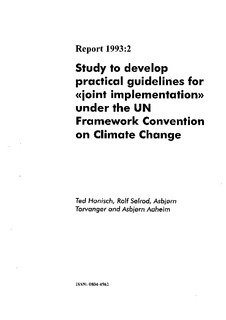Study to develop practical guidelines for "Joint Implementation" under the UN Framework Convention on Climate Change
Abstract
In December 1991, the OECD Environment and Development Ministers directed OECD "to initiate work on mechanisms to facilitate joint implementation, in a cost effective manner, of commitments on greenhouse gases." This report has been prepared for the Environment Directorate of the OECD as part of the response to that directive. The report is also intended to comment on ways of making operational the concept of "joint implementation", as embodied in the United Nations Framework Convention on Climate Change (FCCC), signed in Rio de Janeiro in 1992.
Instead of a negotiated agreement on reducing emissions of greenhouse gases (GHGS) where all countries would commit themselves to share the burdens of achieving a global target, we have an agreement where a limited number of countries have committed themselves to strive to return, individually or jointly, to a lower level of anthropogenic emissions of GHGS.
We can assume that the climate effect of any reduction of emissions of GHGs or any growth of carbon sinks is the same, regardless of where it takes place. Because of large differences between countries, inter alia as to their energy sources, systems and degree of technological development, the costs of obtaining a given net emission will vary significantly among countries and between the kinds of measures chosen. Countries which have invested the most in reducing negative environmental effects of GHGs in the past may actually meet the highest marginal costs in the future. That is if rules along the lines of previous international environmental agreements, where all countries were to reduce an equal percentage, i.a. of polluting agents, were to be applied. For this reason, the Convention explicitly stated that policies and measures dealing with climate change should be cost-effective so as to ensure global benefits at the lowest possible cost (FCCC, Article 3.3).
The objective of this study is therefore to suggest practical guidelines to OECD governments on how to operationalize the concept of "joint implementation" in the context of the UN Framework Convention on Climate Change.
This study will inter alia consider the option of establishing a multilateral institution where all countries may cooperate towards meeting an international target which may be negotiated at a later stage.
The report presents the background for the mechanism in Chapter 1, and its main characteristics and ambitions in Chapters 2 and 3. In Chapter 4 different regimes of agreement under which the mechanism could operate are discussed, as in the situation where a negotiated agreement contains an international target to which all participants adhere. A closer description of the elements of the mechanism is given in Chapter 5, with a focus on investment priorities and distribution of costs and benefits. In Chapter 6 different systems for operating the mechanism are discussed, including the required institutional support for these systems. Chapter 7 concludes the report with suggestions for practical guidelines for OECD governments on how to operate the mechanism under the present regime.
